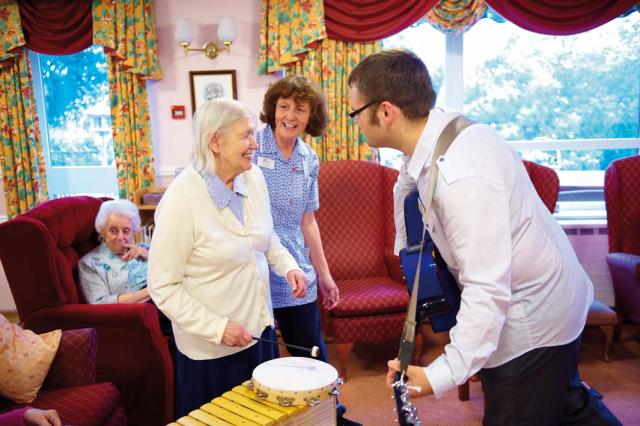- A
- A
- A
Stimulating Minds with music and memory

Monday 26 October 2015
Since I read this piece by Dasha Kiper about her experience of looking after a Holocaust survivor with dementia, I haven’t been able to get it out of my mind. The part that struck me most was when Sam, the survivor’s son, said “Everyone knows Mr Schecter!” and his father replied, “Except Mr Schecter.”
Kiper’s piece observes so much about dementia that we at MHA have been thinking about in our Stimulating Minds campaign to support music therapy (which launched this month). The distress and disorientation that comes with losing memory and communication skills, the effect of the condition on family and caregivers as well as people with dementia themselves. I noticed a lot of talk in the article about language – and I think this is where music therapy, as an alternative, non-verbal language, has a real power.
I’ve seen many music therapy sessions where people who can’t speak still sing, or respond to a musical cue. The research we carried out in our homes along with Anglia Ruskin University showed music therapy bringing demonstrable wellbeing benefits for people with dementia. There’s even some suggestion that music therapy could reduce the need for medication.
I am certain that music therapy would have helped Mr Schecter. It couldn’t cure the condition, of course. But I am sure it could have relieved his anxiety, giving him a way of expressing himself and engaging with Sam; a music therapist could even have used the Yiddish songs of his past to help him remember who he was and how to show it.
Obviously we couldn’t give Mr Schecter any music therapy (how I wish we could!). But there are still so many people with dementia in our care homes who can and do receive it, funded entirely by charitable donations. We want to continue providing more sessions to more people into the future, always without charge, and with people’s generous support of Stimulating Minds, we will be able to.
Kiper talks a lot about language in her article. She finishes with a beautiful line that I’d like to share, with just one small amend of my own, based on everything I’ve seen while providing music therapy at MHA:
“We do go on, because decency requires it, because we cannot abandon those we love, and because the momentum of language music, with its implicit hopes and promises, continues to carry us along.”
Ming Hung Hsu
Lead Music Therapist
